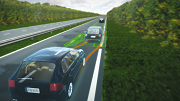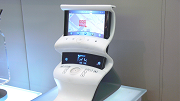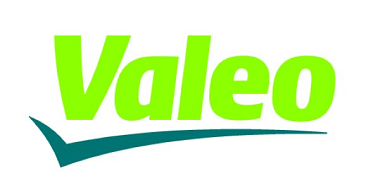Valeo on an Autonomous Driving Tear
Burney Simpson
This is another in a series of profiles of firms in the Driverless Transportation D20 Stock Index.
Valeo in Latin means strong, and the Paris-based auto parts supplier Valeo has lived up to its name recently, all the while becoming a force in the driverless technology industry.
Valeo provides such autonomous systems as lane guidance, automated parking, traffic detection and alerts, and hands-free access and start/stop in models from Audi, BMW, Citroen, Range Rover, Volkswagen, and others. In March, Valeo said it would be offering self-driving vehicle platforms to auto OEMs by 2020.
Valeo’s corporate goal is to reduce CO2 emissions and pioneer ‘intuitive driving,’ that combines the connected vehicle, autonomous driving, and the ‘man-machine’ interface. The company says its products and systems in this sector account for one-third of its orders.
Valeo (VLEEY), with its enterprise value of $12 billion, reported it was looking to acquire firms in the autonomous driving and fuel efficiency sectors, though it didn’t mention any names.

Valeo also officially launched its Drive4U automated-vehicle system as part of its 18-month-old R&D alliance with French military and aerospace supplier Safran. The two are not direct competitors but both claim to be aggressive high-tech French firms with international reach.
SAFETY TECHNOLOGY
Valeo emphasizes safety with its autonomous-driving technology.
The 360Vue in 3D has a multi-minature camera system designed to give the driver a view of her vehicle’s environment. The cameras record the surroundings and transmit the images to an intelligent control unit, which processes and displays them on the vehicle’s color screen. The 360V uses a sensor with seven single radar beams designed to eliminate blind spots. The driver is given an audio warning when a vehicle has entered her car’s ‘danger zone’ where it can’t be seen.
The 360V also offers Cross Traffic Alert, which detects vehicles before they become visible to the driver, a feature Valeo says is especially helpful in parking lots.
A convenience-oriented system is Park4U, which uses ultrasonic front and rear sensors to scan the sides of the road to detect a suitable parking space. Once found, the Park4U sensors steer the car into the space while the driver controls the accelerator and brake. A touch of the steering wheel deactivates the system.

The emissions-reducing Stop-Start system turns off the engine when the vehicle is at a standstill and restarts the engine when the driver lifts his foot off the brake.
A Rain-Light-Humidity sensor controls the wipers by measuring the volume of falling rain, and activates and deactivates low-beam lamps depending on ambient light levels.
TEAMING UP
Valeo is a believer in partnering with strong providers, witness the deal with Safran. The two created a biometric technology offering that features facial authorization and iris recognition. This You Tube video displays their system that authorizes the driver to start the vehicle, and monitors his driving. The technology is being positioned as a safety and security tool for fleets.
In March, Valeo reported an alliance with Israel-based Mobileye where Valeo will design and produce front-facing camera- and sensor systems using Mobileye’s EyeQ family of image-processing microprocessors and computer-vision algorithms.
(STOCK) MARKET POWER
Valeo reported strong 2014 numbers, with sales at $13.5 billion, up 9 percent from 2013, and net income of $596 million, up 28 percent from the previous year. Of late, the company stock has been trading near its 52-week high of $77.66.
Valeo is ranked 14 of the top 100 global suppliers by Automotive News. The firm has a presence in 29 countries, 78,500 employees, 16 research centers, and more than 130 plants. About 50 percent of sales are in Europe/Africa, 28 percent in Asia, 20 percent in North America, and 23 percent in South America.
The French government is Valeo’s top shareholder, with its BPI public investment bank owning 1.7 percent of the company, and the French state lender CDC holding another 1.8 percent, according to Reuters.
It’s been a good quarter for Valeo as it takes its place as a global leader in autonomous driving technology. Now that the bar has been set, the firm must surpass itself over the rest of the year.

